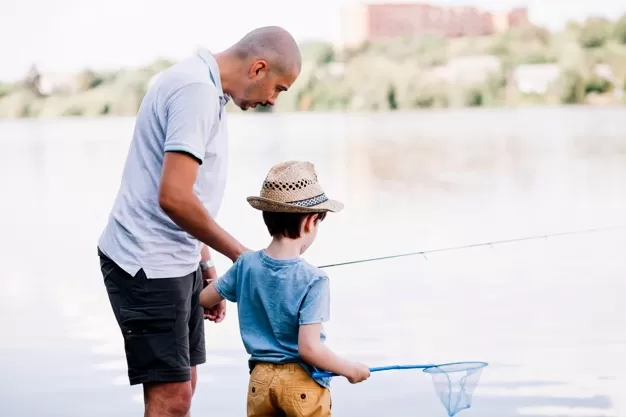After a string of underwhelming outings, did you decide to call it quits on fishing? Avoid missing out on a good opportunity any longer. With the help of these tips, you’ll be able to recapture the joy of fishing once again. Pick up a few useful fishing tips by skimming the text.
As long as possible, keep a fish in the water after you’ve caught it. Leave a fish in the water if you see him but haven’t finished your fishing for the day. It is possible to tether him to your boat and use it as a trawler for the rest of the day. As a result, the fish can be kept fresher for a longer period of time.
Use a sinker when the weather is cold. During the cold season, the fish are more likely to be found in deeper waters. The number and size of sinkers to use on the line will be determined by the water depth.
If you’re going fishing with live bait, avoid exposing it to the sun for an extended period of time. The majority of fish prefer bait that is cooler rather than hotter. Wait until you are ready to use the trick before storing it in an insulated container
Before making one last attempt to land a fish, make sure your hands are completely submerged in water. This prevents the fish from drying out. If you intend to release your catch back into the water, then this technique is even more critical for you to employ..
There is no need to keep every fish that is caught. The common courtesy of releasing small and excessive catches is well-known and appreciated. If you control the amount of fish that you remove from a lake, it helps to ensure that there will be plenty of fish for future seasons.
Don’t try to fly fish in the wind. Casting will be less accurate if there is too much wind. There is less wind in the mornings and evenings when you can do your fly fishing. Position yourself with the wind rather than against it or to your side if you’re having trouble in the wind.
Cut the line that’s holding the fish! If you want to release a fish that has swallowed its hook, you can still do so. Release the fish after cutting the line as close to the mouth as possible. A fish’s stomach acid is potent enough to dissolve a hook.
Try to fish in areas with plenty of shade. Both you and the fish will benefit from this arrangement. Why so many fish are found in places with shade, where fallen trees and foliage have a greater chance of making it into the water?
Fishing involves a lot of sensitive equipment, and you want to be sure that you use it safely. Prepare yourself to safely store all of your sharp fishing equipment (knives, hooks, and the like) when you’re not using it by developing a routine. Any fishing trip can be ruined by a stray knife in the boat’s hull.
If you’re going fishing, be sure to bring a net to keep the fish safe. You’ll want to make sure you have a way to keep any fish you catch from scurrying all over the place. You’ll have a better chance of catching your fish if you do this.
Make sure you’re using a lure that can get around the milfoil rather than through it to catch the big fish. Lures that snag milfoil will be less palatable to fish. An alternative to the traditional weed-eating sinker is the use of a lighter, floating lure.
If you’re looking for a new way to fish a well-known spot, consider going night fishing. In addition to the lights on your boat, a headlamp can provide you with enough light to see. There will be a wide variety of fish to be caught because of the feeding habits of the species that are present.
To catch fish, you need to have a lot of patience. If you’re not a patient person, you may want to try a different sport that you enjoy more. Alternatively, you can practice patience by gradually increasing the length of your fishing outings.
Check to see if you’re using a catch and release method before returning the fish. Take the hook out of the fish’s mouth with wet hands. The fish should be returned to the water in a gentle manner. Trim the line if the fish has gone too deep and the hook will dissolve in the fish.
When it comes to tying your lures or bait to your line, an excellent fishing tip is to become familiar with the improved clinch knot. This knot will keep your line from getting tangled in a snag or getting snagged on a fish. Make sure you practice, practice, practice before attempting any new knots.
A fishing line should never be thrown into a body of water. There are many marine animals that can become entangled in fishing lines because they are not visible to the naked eye. This has the potential to cause harm, and in the worst-case scenario, death. To prevent it from being blown overboard by even the strongest winds, you should always be cautious when changing your line.
Take the time to do some research before embarking on a fishing expedition. Despite its apparent simplicity, catching fish is surprisingly difficult. You need to know the habits of the fish, where they can be found, and what you can do to improve your chances of catching a fish. Make the most of the internet to learn as much as possible.
You’ve probably gained a lot more knowledge about fishing as a result of this experience. It’s just as important to have patience and perseverance when fishing as it is to have the right fishing gear.


